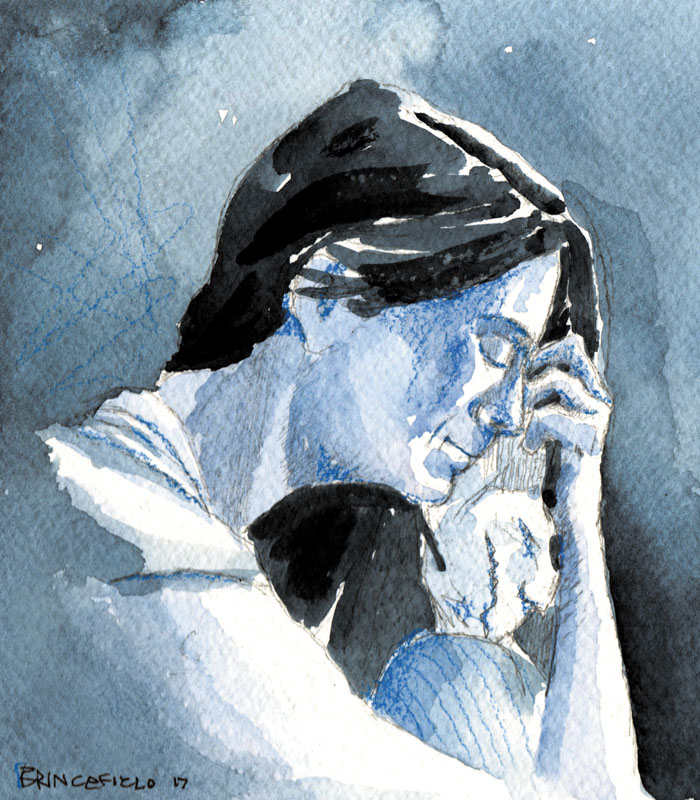Death and grief: Dealing with the loss of a loved one
Published 12:00 am Sunday, July 16, 2017

- Grief. Illustration by Mark Brincefield
By Nina Oliver
Rowan County Public Health Director
The phone call came in around 4:50 a.m. on April 30. My sister’s boyfriend called and told me that my sister, Nikki, had passed away that morning around 3:30 a.m.
I went numb immediately.
My sister lived a complicated and complex life. She suffered from mental illness, drug and alcohol addiction, and had a relentless eating disorder that consumed most of her life. Due to these issues, she spent lots of time in and out of hospitals, eating disorder treatments, jails and mental health facilities.
She had several brushes with death. Two years ago during Thanksgiving, she became so thin she weighed about 85 pounds. My mother and I talked about the possibility that she would not live that much longer. We wished we were wrong. Nikki passed at 36 from cardiac arrest. Her little body could no longer take the stress and strain that was being demanded of it.
Even through all her trials and tribulations, she persevered through so much. She seemed to be doing better in certain aspects of her life. I was proud of her. But to complicate things even further, the last conversation I had with her in February ended in a huge fight.
Since we were both so angry with each other, we hadn’t talked before she passed. I simply assumed, as I’d done in the past, that we would cool down and allow some time to pass before we spoke again.
I never got that chance.
I remember days after her death, I felt an overwhelming sadness or grief. I was grieving because I missed her, because of how we left things, and because I regretted not being a better older sister.
When you lose someone or something that you love, you will go through a grieving process. This process is your mind and body trying to cope with a profound loss or new void in your life.
Grief is a natural psychological response to life experiences like divorce, retirement, illness, job loss, a miscarriage, broken relationships and death. Grief typically needs to run its course, as ignoring the pain can make the situation worse.
This process is different for everyone and the time in which you grieve is different. Some will grieve for a couple of months and others a year or more. The Mayo Clinic lists sadness, loneliness, anger, anxiety, insomnia and fatigue as potential grief reactions, which are often triggered by dates, places and other reminders.
Most people are familiar with or have heard of the Five Stages of Grief, also known as the Kubler-Ross model. Elisabeth Kubler-Ross introduced the five stages of grief: denial, anger, bargaining, depression and acceptance.
The five stages of grief are not linear; they can occur in any order, and possibly more than once or not at all. Everyone grieves differently. Instead, it’s more helpful to look at the stages as guides in the grieving process — it helps you understand and put into context where you are.
The five stages are:
- Denial: This stage is often experienced as a state of shock. You may feel numb, disoriented or overwhelmed. Some report a trance-like state or a sense of unreality. Though confusing, these feelings help us to slowly come to terms with the reality of the loss, rather than dealing with all of our emotions up front.
- Anger: Anger can be directed at anyone who you feel has blame in your loss. You might feel anger toward your family and friends, your loved one who has passed, or the doctors who were unable to save them. You may also be angry with yourself or the world. This anger is a manifestation of the pain of your loss.
- Bargaining/Guilt/Regret: You may find yourself asking “what if” questions, thinking about what could have been done to save your loved one, and perhaps bargaining with God or the world: “If I could have just one more day with them…” Bargaining is often accompanied by guilt. This is basically our way of negotiating with the hurt and pain of the loss.
- Depression: Depression and sadness are the most recognizable symptoms of grief, yet all too often grieving persons are expected to “snap out of it” and act normal. It’s important to understand that after the loss of a loved one, depression is a perfectly normal emotional response. During this stage, you will likely withdraw from normal activities and feel as if you are in a fog of sadness.
- Acceptance: This is the point where we accept our new reality, one in which our loved one is no longer present. Acceptance does not necessarily mean that you’re OK with your situation; it simply means you recognize that the person is indeed gone, that your situation has changed. Acceptance is also when we begin to pick up the pieces and reorganize our lives to fit in with this new reality.
The bevy of feelings and emotions you feel after a loss is normal and common. You may not be prepared for the intensity and duration of your emotions or how swiftly your moods may change.
You may even begin to doubt the stability of your mental health. But be assured that these feelings are often normal and appropriate and will help you come to terms with your loss.
Remember: It takes time to fully absorb the impact of a major loss. You never stop missing your loved one, but the pain eases after time and allows you to go on with your life. Mourning is the natural process you go through to accept a major loss.




